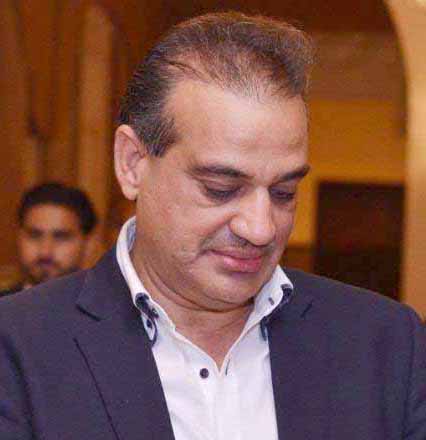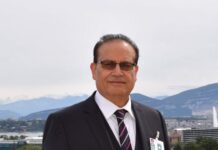Comment
Ansar M Bhatti
By selecting Barrister Gohar as the interim Chairman of the PTI, Imran Khan has strategically outmaneuvered his opponents, catching them off guard with a shrewd and astute move. The decision reflects Khan’s political acumen and ability to make calculated choices that go beyond expectations. The appointment of Barrister Gohar benefits Imran Khan on two accounts; first Gohar would immediately step down whenever asked to do so and Secondly, Imran Khan has strategically chosen to distance himself from the pitfalls of family politics, a move that seeks to set a precedent and foster a culture of meritocracy within the PTI. By eschewing the appointment of any close relatives, Khan sends a clear message about his commitment to transparency, fairness, and the avoidance of nepotism in political affairs. This step not only bolsters the image of the PTI as a party that prioritizes competence over familial connections but also safeguards against potential criticism from those wary of dynastic tendencies in politics
In essence, Imran Khan’s choice of Barrister Gohar as the caretaker Chairman showcases a thoughtful and strategic approach. So far, the decision appears to be a well-calibrated move that strengthens PTI’s image and sets a positive precedent for political leadership in the party.
Nevertheless, lingering uncertainties surround the integrity of intra-party elections, underscoring a critical flaw in the political landscape of Pakistan. The inherent issue lies in the absence of genuine democracy within the political parties themselves. Regrettably, these internal elections often amount to mere theatrical displays, lacking true democratic essence. The process tends to be more of a selective endeavor, raising a pertinent query: If democracy remains elusive within the very foundations of political entities, how can they be entrusted with fostering democratic principles at a national level?
Regarding the scheduled elections on February 8, the Finance Ministry has allocated more than Rs 27 billion in response to the Election Commission’s request, significantly enhancing the outlook for the upcoming elections. This robust financial support indicates a positive shift, diminishing concerns related to funding as a potential obstacle. In previous instances, such as when the apex court directed the Election Commission to conduct elections in the Punjab and KP assemblies, insufficient funds were a prominent reason cited by the ECP for the delay. It is noteworthy that at that time, financial constraints were not the sole contributing factor; other issues also played a role in the postponement of elections.
The current scenario presents a surprising turn of events, with the Establishment seemingly placing its bets on the PML N, a move that can only be described as a miraculous development given the historical dynamics between the two. Despite a fraught past, both parties are fully cognizant of this reality. The challenge arises from the strategic necessity for PML N and PPP support in the overarching plan to dislodge the PTI government. Consequently, the Establishment found itself compelled to approach the PML N.
In parallel, the PML N, led by Nawaz Sharif and his associates, found themselves in a position where Establishment support was not only imperative for the resolution of legal issues but also pivotal for an active re-entry into the political arena, perhaps even eyeing a fourth term as the prime minister. However, this tactical alliance has placed the image and future well-being of both the PML N and the Establishment in precarious territory. The risks associated with this collaboration loom large, as it calls into question the credibility and standing of these entities in the eyes of the public and the broader political landscape. The delicate balance between strategic necessity and potential reputational jeopardy underscores the complexity of the political chessboard at play.
Nawaz Sharif’s decision to maintain a low profile since his return to Pakistan seems to stem from his perceived association with the Establishment. His political narrative, at least in recent times, has largely centered around an anti-Establishment stance. This creates a delicate situation for him during public appearances, as the absence of any mention of his established narrative might lead to a political setback. It appears that he is currently treading cautiously, recognizing the potential risks involved.
This strategic silence may be a temporary measure, a calculated move to navigate the complex political landscape. By avoiding explicit references to his anti-Establishment stance, Nawaz Sharif may be attempting to avoid direct confrontation or escalation, possibly in an effort to find a more conducive environment for political engagement. However, it’s crucial to note that sustaining such a position for an extended period could be challenging.
Nawaz Sharif finds himself caught between opposing forces, akin to being “between the devil and the deep sea.” Striking a delicate balance between maintaining political relevance and avoiding unnecessary conflicts is a formidable challenge. The coming days will likely reveal whether this low-profile strategy is a short-term tactical maneuver or a more enduring aspect of his political approach. The evolving dynamics of his relationship with the Establishment will play a pivotal role in shaping the future trajectory of his political career.
On the contrary, the enduring popularity of the PTI remains a source of concern for those in positions of authority. Despite various challenges, the party’s appeal shows no signs of waning, posing a potential obstacle to the established powers. The prospect of a genuinely transparent and equitable election raises the likelihood of the PTI reclaiming power.
In a bid to curtail the PTI’s chances, there is speculation that the party might face the removal of its distinctive election symbol – the ‘bat.’ This strategic move aims to disrupt the party’s connection with voters, particularly in rural areas where illiteracy prevails. The risk lies in the potential confusion among voters, accustomed to identifying the PTI by the ‘bat’ symbol. Altering this familiar emblem could create a hurdle for the party as voters may struggle to navigate the ballot.
In summary, the persistent reality in Pakistani politics is the undeniable influence of the Establishment, which often intervenes in political affairs due to the consistent underperformance of civilian governments. It is imperative for the political leadership to recognize that such interference will persist unless they address internal issues. The recurrent removal of political administrations is typically justified by allegations of corruption. Corruption stands out as a formidable challenge afflicting the nation, and unless it is decisively addressed, Pakistan’s progress will remain stagnant. It is crucial to tackle this menace head-on to pave the way for genuine political stability and socio-economic development.

















